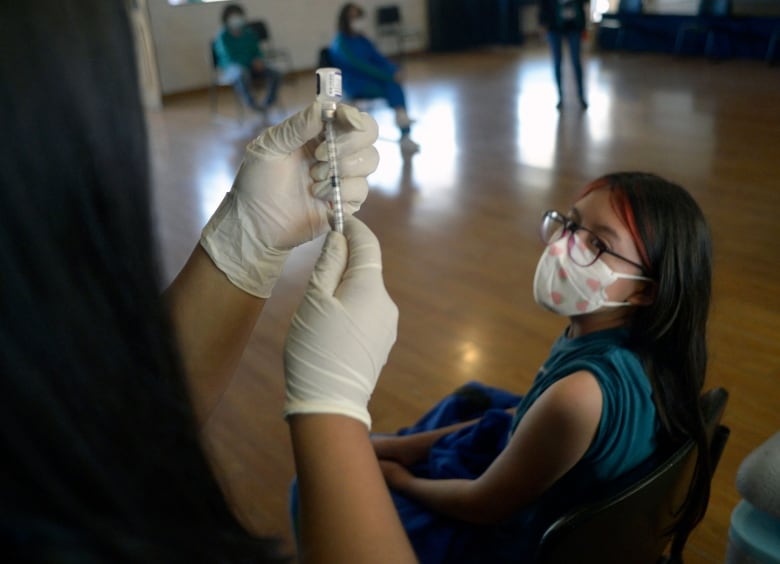The latest:
Alaska, which led most U.S. states in coronavirus vaccinations months ago, took the drastic step on Wednesday of imposing crisis-care standards for its entire hospital system, declaring that a crushing surge in COVID-19 patients has forced rationing of strained medical resources.
Gov. Mike Dunleavy and health officials announced the move as the tally of newly confirmed cases statewide reached another single-day record of 1,224 patients amid a wave of infections driven by the spread of the highly contagious delta variant among the unvaccinated.
The delta variant is "crippling our health-care system. It's impacting everything from heart attacks to strokes to our children if they get in a bike accident," Dr. Anne Zink, Alaska's chief medical officer, said at a news conference with Dunleavy.
Alaska's health and social services commissioner, Adam Crum, announced that he signed an emergency addendum extending to the whole state standards of crisis care announced last week at the state's largest hospital, Providence Alaska Medical Center in Anchorage. The new document limits liability faced by providers for crisis-level medical care in all Alaska hospitals.
Moreover, it acknowledges the realities of rationed care statewide, with scarce medical supplies and staff prioritized in a way that denies normal levels of care to some patients for the sake of others, depending on how sick they are and their chances for recovery.
To cope with the COVID-19 influx, Alaska has signed an $87 million US contract to enlist hundreds of health-care workers from out of state, officials said.
About one-fifth of Alaska hospital patients are infected with COVID-19, according to state data. But that figure understates the burden placed on the system as a whole as it "squeezes out" capacity to treat victims of car accidents, strokes, heart attacks and other ailments, Dunleavy said.
Paradoxically, back in April, Alaska had ranked among the top states getting COVID-19 vaccines into the arms of residents, helped in large part by efforts of the state's pandemic-conscious Indigenous population.
Alaska has since slipped below the national average, with just 58 per cent of residents aged 12 and older fully vaccinated, according to the state database. The vaccination slump coincided with significant political resistance to public health requirements.
-From Reuters, last updated at 6:45 a.m. ET
What's happening across Canada

Saskatchewan's only children's hospital is opening its pediatric intensive care unit to younger adults with COVID-19.
Those under the age of 40 are getting admitted to the Jim Pattison Children's Hospital in Saskatoon. The Saskatchewan Health Authority said Wednesday that so far two adults are in the pediatrics ICU, and space is being made for more.
Dr. Susan Shaw, the health authority's chief medical officer, said critical care capacity is under strain.
The province has recently been reporting record numbers of COVID-19 hospitalizations — mostly unvaccinated patients.
-From The Canadian Press, last updated at 6:40 a.m. ET
What's happening around the world

As of early Thursday morning, more than 230.1 million cases of COVID-19 had been reported worldwide, according to Johns Hopkins University's case tracking tool. The reported global death toll stood at more than 4.7 million.
In the Americas, the Pan American Health Organization has warned that countries in the region could continue to face localized COVID-19 outbreaks well into 2022, even while deaths have fallen from their peak in January.
In the Middle East, Syria is facing a new surge in infections in both government-held areas and territory outside state control that could overwhelm the war-ravaged country's fragile health system.
In Africa, Uganda's president has eased restrictions, allowing the resumption of education for universities and other post-secondary institutions, citing a decline in infections.

In the Asia-Pacific region, police in the Australian city of Melbourne prepared for a fourth day of anti-lockdown protests on Thursday while a vaccination hub closed after protesters abused staff, the operator said, while COVID-19 cases across the state of Victoria hit a daily record. Hundreds of protesters have taken to the streets in the city of five million since officials this week ordered a two-week closure of building sites and made vaccines mandatory for construction workers to limit the spread of the virus.
Japan plans to give other countries 60 million doses of COVID-19 vaccines, Prime Minister Yoshihide Suga said, doubling the target from the previous pledge of 30 million doses.
Thailand pushed back plans to reopen Bangkok and some other major cities to foreign arrivals until November.
In Europe, Italy plans to give other countries 45 million doses of COVID-19 vaccines before the end of the year, three times its original pledge, Prime Minister Mario Draghi said.
-From Reuters and The Associated Press, last updated at 6:35 a.m. ET

















